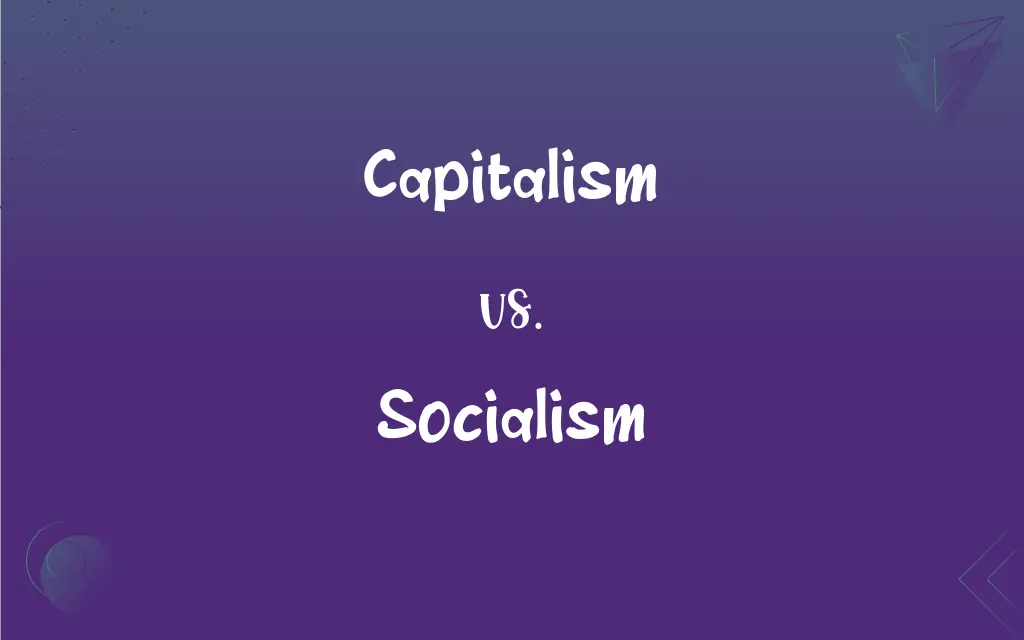Capitalism vs. Socialism: What's the Difference?
Edited by Janet White || By Harlon Moss || Updated on October 12, 2023
Capitalism prioritizes private ownership and free markets, while socialism emphasizes equal distribution of wealth and government control of the economy.

Key Differences
In capitalism, the means of production, such as factories and businesses, are owned by private individuals and entities. Capitalism puts the control in the hands of the capitalists, who seek profit and competitiveness, believing that this drive fosters innovation and efficiency in the market. The role of the government in capitalist systems is often minimized, allowing market forces like supply and demand to predominantly shape the economy.
On the other side, socialism believes in an egalitarian society where wealth and power are distributed more evenly among the citizens. In a socialist system, the government often owns or significantly influences the means of production and distribution of resources. Socialism promotes a collective approach to creating societal structures, asserting that this ensures the well-being and prosperity of all individuals, not just those with wealth and power.
Capitalism advocates for an environment where decisions regarding investment, production, and distribution are driven by individuals or corporations in the market. This system posits that unrestricted competition facilitates the most efficient use of resources and ultimately leads to higher standards of living. The inequalities arising in capitalism are often justified by the perceived meritocracy within the system.
Contrastingly, socialism tends to uphold ideals of cooperation, equal opportunity, and equal outcome, opposing the economic and social inequalities emerging from capitalist systems. Through various forms of government intervention, socialism seeks to reduce or eliminate the unequal distribution of wealth, providing citizens with equal access to resources and opportunities, and ensuring their basic needs are met.
While capitalism may be critiqued for perpetuating inequalities and prioritizing profit, it is also lauded for promoting innovation, individual freedom, and economic efficiency. Conversely, socialism, while often praised for its inclusivity and focus on social welfare, may be critiqued for potentially stifling individual initiative and being less economically efficient due to reduced competition.
ADVERTISEMENT
Comparison Chart
Ownership
Private individuals and entities
Government or collective
Economic Equality
Generally not prioritized
Highly prioritized
Government Role
Limited
Extensive
Distribution of Wealth
Unequal, based on market success
Aimed at equal distribution
Incentive
Profit and individual gain
Collective welfare and equality
ADVERTISEMENT
Capitalism and Socialism Definitions
Capitalism
Capitalism emphasizes private ownership and the free market.
In capitalism, businesses compete freely without significant governmental restraint.
Socialism
Socialism emphasizes equal distribution of wealth and income among all citizens.
Socialism aims to diminish wealth disparities by redistributing resources evenly among the population.
Capitalism
In capitalism, wealth creation and distribution are largely left to the voluntary actions of individuals and businesses.
Capitalism enabled him to build wealth by investing in various enterprises.
Socialism
In socialism, collective or governmental decisions guide the distribution and allocation of resources.
In socialism, public policies are often devised to prioritize community well-being over individual wealth accumulation.
Capitalism
In capitalism, government intervention in the economy is generally minimal.
The laissez-faire approach to capitalism allowed businesses to operate with minimal regulation.
Socialism
Socialism aims to provide all citizens with basic services and equal opportunities.
The universal healthcare provided under socialism ensures that all citizens have access to medical services.
Capitalism
Capitalism often results in social and economic hierarchies, as wealth and ownership are unequally distributed.
The tycoons in capitalism accumulated wealth, establishing a distinct upper class.
Socialism
In socialism, the government often controls major industries and means of production.
Under socialism, the government managed healthcare and education sectors, ensuring universal access.
Capitalism
Capitalism encourages competitive practices, seeking to drive economic prosperity and innovation.
The new technology thrived in the capitalism of the market, spurring competitive advancements.
Socialism
Socialism seeks to minimize economic inequalities by regulating wealth accumulation.
Through socialism, the government implemented policies to limit the income gap between different societal layers.
Capitalism
An economic system in which the means of production and distribution are privately or corporately owned and development occurs through the accumulation and reinvestment of profits gained in a free market.
Socialism
Any of various theories or systems of social organization in which the means of producing and distributing goods is owned collectively or by a centralized government that often plans and controls the economy.
Capitalism
(politics) A socio-economic system based on private ownership of resources or capital.
Socialism
The stage in Marxist-Leninist theory intermediate between capitalism and communism, in which the means of production are collectively owned but a completely classless society has not yet been achieved.
FAQs
In what way does capitalism allow for wealth accumulation?
Capitalism allows for wealth accumulation through private ownership and market successes.
What is a key goal of socialism in societal structuring?
Socialism seeks to minimize societal inequalities and ensure basic needs for all.
How does capitalism encourage economic growth?
Capitalism encourages economic growth through competition and entrepreneurial innovation.
Which economic model is more likely to prioritize profit maximization?
Capitalism strongly emphasizes profit maximization.
How does socialism aim to handle unemployment?
Socialism aims to address unemployment through public works and ensuring job availability for all.
What drives individual financial success in a socialist economy?
In socialism, individual financial success is often de-emphasized in favor of collective well-being.
Which system is more likely to have larger government involvement in the economy?
Socialism typically involves more extensive government involvement in the economy.
How does socialism view wealth distribution?
Socialism emphasizes equal wealth distribution among all citizens.
In which economic system are resources allocated through centralized planning?
Socialism often involves centralized planning for resource allocation.
Does capitalism usually ensure equal access to healthcare and education for all citizens?
No, capitalism does not ensure equal access and such services are often linked to individual wealth and capability.
How do capitalists view competition in the market?
Capitalists view competition as a crucial driver for innovation and economic development.
Does socialism usually result in higher taxes compared to capitalism?
Yes, socialism often involves higher taxes to fund public services and ensure equal distribution.
What guides production and pricing in socialism?
In socialism, production and pricing are often guided by government planning.
What is the primary focus of capitalism?
Capitalism primarily focuses on private ownership and free markets.
Does socialism support individual or collective ownership?
Socialism supports collective ownership or significant governmental control.
How does capitalism address social welfare?
Capitalism often addresses social welfare through charitable activities and limited government programs.
Which system, capitalism or socialism, is considered more egalitarian?
Socialism is often considered more egalitarian due to its emphasis on equal distribution.
Which economic system typically experiences higher levels of inequality?
Capitalism often experiences higher levels of economic and social inequality.
How do proponents of capitalism view governmental interference in markets?
Proponents of capitalism generally prefer minimal governmental interference in markets.
In which system is private property more prevalent?
Private property and ownership are foundational aspects of capitalism.
About Author
Written by
Harlon MossHarlon is a seasoned quality moderator and accomplished content writer for Difference Wiki. An alumnus of the prestigious University of California, he earned his degree in Computer Science. Leveraging his academic background, Harlon brings a meticulous and informed perspective to his work, ensuring content accuracy and excellence.
Edited by
Janet WhiteJanet White has been an esteemed writer and blogger for Difference Wiki. Holding a Master's degree in Science and Medical Journalism from the prestigious Boston University, she has consistently demonstrated her expertise and passion for her field. When she's not immersed in her work, Janet relishes her time exercising, delving into a good book, and cherishing moments with friends and family.































































